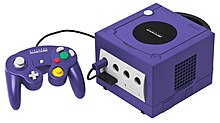
The Game Boy Advance (GBA) is a 32-bit handheld game console developed, manufactured and marketed by Nintendo as the successor to the Game Boy Color. It was released in Japan on March 21, 2001, in North America on June 11, 2001, in the PAL region on June 22, 2001, and in mainland China as iQue Game Boy Advance on June 8, 2004.

The Legend of Zelda is an action-adventure game franchise created by the Japanese game designers Shigeru Miyamoto and Takashi Tezuka. It is primarily developed and published by Nintendo, although some portable installments and re-releases have been outsourced to Flagship, Vanpool, and Grezzo. The gameplay incorporates action-adventure and elements of action RPG games.

The GameCube is a home video game console developed and marketed by Nintendo. It was released in Japan on September 14, 2001, in North America on November 18, 2001, in Europe on May 3, 2002, and in Australia on May 17, 2002. It is the successor to the Nintendo 64 (N64) and the predecessor to the Wii. As a sixth-generation console, the GameCube primarily competed with the PlayStation 2 and Xbox.

Pokémon Stadium, known in Japan as Pokémon Stadium 2, is a strategy video game developed and published by Nintendo for the Nintendo 64. First released in Japan on April 30, 1999, it was later released as the first Stadium title in Western regions the following year, being the sequel to the Japanese-only 1998 Nintendo 64 release Pocket Monsters’ Stadium. The gameplay revolves around a 3D turn-based battling system using the 151 Pokémon from the Game Boy games Pokémon Red, Pokémon Blue, and Pokémon Yellow.
In the history of video games, the sixth generation era is the era of computer and video games, video game consoles, and handheld gaming devices available at the turn of the 21st century, starting on November 27, 1998. Platforms in the sixth generation include consoles from four companies: the Sega Dreamcast (DC), Sony PlayStation 2 (PS2), Nintendo GameCube (GC), and Microsoft Xbox. This era began on November 27, 1998, with the Japanese release of the Dreamcast, which was joined by the PlayStation 2 on March 4, 2000, the GameCube on September 14, 2001 and the Xbox on November 15, 2001, respectively. On March 31, 2001, the Dreamcast was among the first to be discontinued. Xbox in 2006, GameCube in 2007 and PlayStation 2 was the last, in January 2013. Meanwhile, the seventh generation of consoles started on November 22, 2005, with the launch of the Xbox 360.
2003 saw many sequels and prequels in video games, such as Tony Hawk's Underground, Madden NFL 2004, NBA Live 2004, ESPN NBA Basketball, Saya no Uta: The Song of Saya, Final Fantasy X-2, Mario Kart: Double Dash, Mario & Luigi: Superstar Saga, Prince of Persia: The Sands of Time, Sonic Heroes, Postal 2, Star Wars: Knights of the Old Republic, Uru: Ages Beyond Myst, and WWE SmackDown! Here Comes the Pain. New intellectual properties included Beyond Good & Evil, Boktai: The Sun is in Your Hand, Call of Duty, Disgaea, Drakengard, Manhunt, PlanetSide, TrackMania, True Crime: Streets of LA, and Viewtiful Joe.

Nintendo Selects is a marketing label previously used by Nintendo to promote best-selling video games on Nintendo game consoles. Nintendo Selects titles were sold at a lower price point than new releases. The program paralleled other budget range software by Sega, Sony, and Microsoft to promote best-selling games on their consoles as well. In Japan, the discount label was introduced in 2015 for various Nintendo 3DS titles as the Happy Price Selection, although South Korea adopted the Nintendo Selects name at an earlier period. The most recent Nintendo Selects titles were released for the Wii U and 3DS and, as of January 2024, no Nintendo Switch games have been rebranded as Nintendo Selects.

Pokémon Snap is a 1999 first-person photography game with rail shooter style gameplay mechanics developed by HAL Laboratory and published by Nintendo for the Nintendo 64. It was first released in Japan in March 1999 and was later released in July 1999 in North America and in September 2000 for PAL regions. It is a spin-off game in the Pokémon series, being one of the first console-based games for it, and featuring many Pokémon rendered for the first time in real-time 3D. The game was re-released for the Wii's Virtual Console in December 2007, for the Wii U's Virtual Console in 2016, and for the Nintendo Switch Online + Expansion Pack in June 2022.
Nintendo Space World, formerly named Shoshinkai and Famicom Space World, was an annual video game trade show hosted by Nintendo from 1989 to 2001. Its three days of high-energy party atmosphere was the primary venue for Nintendo and its licensees to announce and demonstrate new consoles, accessories, and games. Anticipated and dissected each year with hype and exclusivity, it was a destination for the international video game press, with detailed developer interviews and technology demos.

The Legend of Zelda: Twilight Princess is a 2006 action-adventure game developed and published by Nintendo for the GameCube and Wii. Originally planned for release exclusively on the GameCube in November 2005, Twilight Princess was delayed by Nintendo to allow its developers to refine the game, add more content, and port it to the Wii. The Wii version was a launch game in North America in November 2006, and in Japan, Europe, and Australia the following month. The GameCube version was released in December 2006 as the final first-party game for the console.
2006 saw the release of many sequels and prequels in video games, prominently including Grand Theft Auto: Vice City Stories, Madden NFL 07, NBA Live 07, NBA 2K7, WWE Smackdown vs. Raw 2007, Tony Hawk's Project 8, New Super Mario Bros., Sonic the Hedgehog, and The Legend of Zelda: Twilight Princess, alongside many prominent new releases including Bully, Company of Heroes, Dead Rising, Gears of War, Just Cause, Lost Planet: Extreme Condition, Ōkami, Prey, Resistance: Fall of Man, Saints Row, and Thrillville. Two new home consoles were released during the year: Nintendo's Wii and Sony's PlayStation 3.

The Capcom Five are five video games that were unveiled by Capcom in late 2002 and published from March 2003. At a time when Nintendo's GameCube console had failed to capture market share, Capcom announced five new GameCube titles with the apparent goal of boosting hardware sales and demonstrating third-party developer support. Capcom USA followed up with confirmation that they would be exclusive to the GameCube. The five games were P.N.03, a futuristic third-person shooter; Viewtiful Joe, a side-scrolling action-platformer; Dead Phoenix, a shoot 'em up; Resident Evil 4, a survival horror third-person shooter; and Killer7, an action-adventure game with first-person shooter elements. Though not directly related to each other, they were all overseen by Resident Evil director Shinji Mikami and, except Killer7, developed by Capcom's Production Studio 4. Capcom USA later clarified that only Resident Evil 4 was intended to be exclusive; the initial announcement was due to a miscommunication with their parent company.

Pokémon Battle Revolution is a turn-based strategy video game in the Pokémon series developed by Genius Sonority and published by The Pokémon Company and Nintendo. It was released for the Wii on December 14, 2006, in Japan; on June 25, 2007, in North America; on November 22, 2007, in Australia, and on December 7, 2007, in Europe. Along with being the first Wii incarnation of the Pokémon video game franchise, it is also the first Wii game to use the Nintendo Wi-Fi Connection in North America and Japan and the second Wii game to wirelessly interact with the Nintendo DS handheld.

The Japanese multinational consumer electronics company Nintendo has developed seven home video game consoles and multiple portable consoles for use with external media, as well as dedicated consoles and other hardware for their consoles. As of September 30, 2021, in addition to Nintendo Switch, Nintendo has sold over 863.07 million hardware units.









